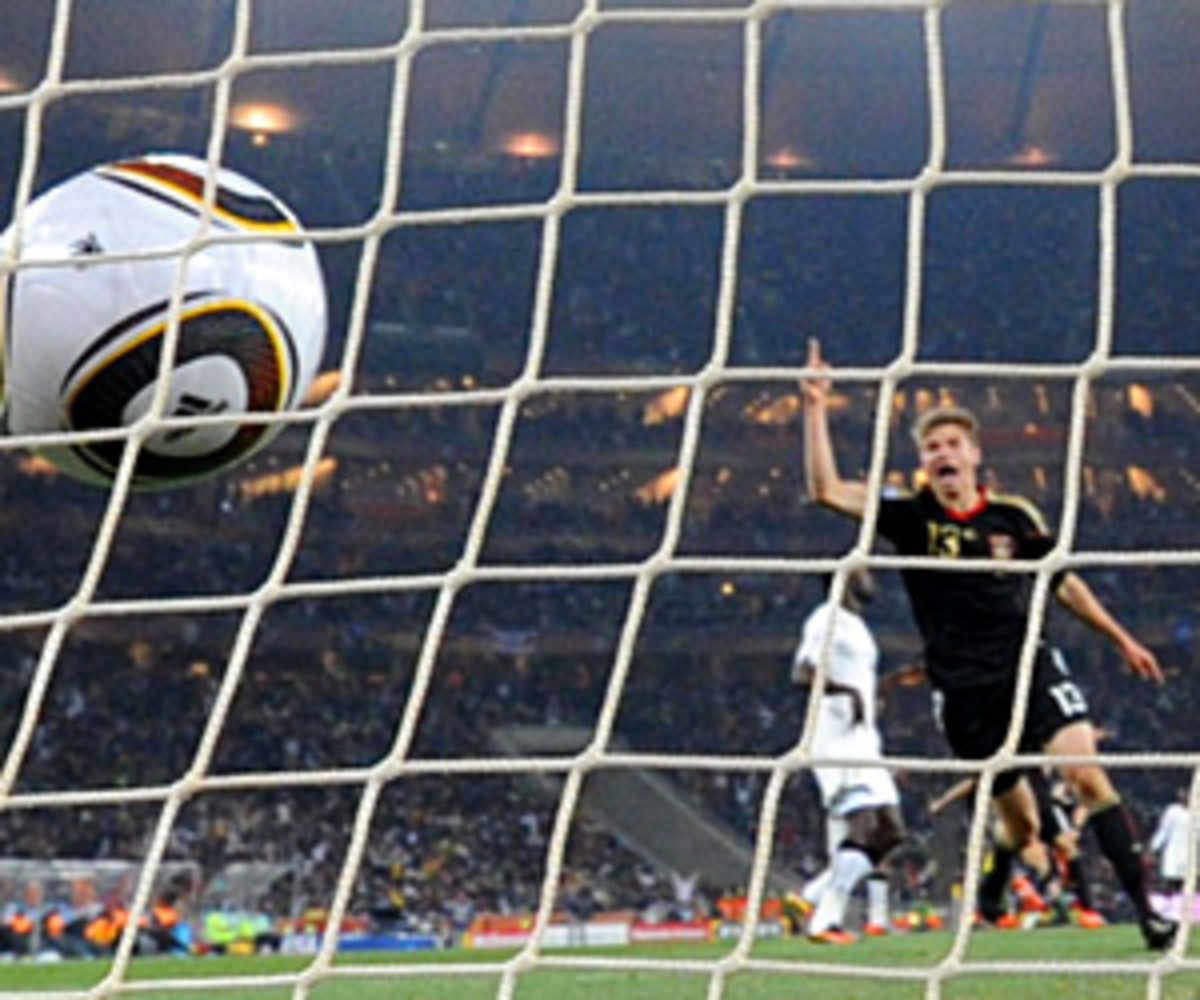
'New Germany' shows old resilience in victory over Ghana
The youngest and most multi-cultural squad ever? Check*. Playing a short-passing game with an army of tricky midgets in midfield? Check. Losing their first group game since 1986? Check. Missing a penalty? Check.
There was only one thing left to do if JoachimLöw's exciting but inexperienced team really wanted to live up to the "New Germany" tag: get knocked out in the group stage of a World Cup, for the first time ever.
This, alas, they couldn't quite do. In fact, the 1-0 win over Ghana saw plenty of "New Germany" (very fast -- at times much too fast attacking -- coupled with defensive frailty) but quite a bit of the tried and tested stuff, too: a healthy dose of classic resilience and the amazing knack to get a result when it really matters.
Löw will be mightily relieved that he won't be the first Germany coach to come home before the first round of matches is over. One unprecedented event did come to pass in Johannesburg's Soccer City Stadium, however: Jerome Boateng came into the Germany XI to take on brother Kevin-Prince Boateng in the first fraternal face-off the World Cup has ever seen. This was a dream scenario for the German tabloid press, who had spent the best part of the week portraying Boateng vs. Boateng as a mighty tussle between good (nice middle-class Jerome) and evil (self-styled "ghetto-kid" and Ballack-nemesis Kevin-Prince). Their paths actually seldom crossed on the pitch. Manchester City-bound Jerome played in the left-back position for the dropped Holger Badstuber while the Portsmouth FC Boateng anchored the Black Star's midfield.
Germany wasn't in the mood for a patient game. The Germans moved the ball quickly through the excellent Schweinsteiger to Brazilian-born striker Cacau, a "playing" attacker eager to take up wide positions and to interchange with Mesut Özil. Löw had clearly identified young Jonathan Mensah, who plays football in the third Spanish division with Granada, as the weak link.
For all its eye-pleasing passing and possession, Germany lacked finesse in the final third, though. The team could not really convert its dominance into clear-cut chances. Cacau is not a natural attacker to lead the line on his own. Against the physically strong Ghanaians, he was often crowded out.
Thomas Müller, too, couldn't really get into the game. His best performances for Bayern Munich last season came as a shadow striker/roving midfielder behind front man Ivica Olic. At this World Cup, he's played on the right side of midfield and needs to keep his position. The 20-year-old is only allowed to start cutting inside near the opposition box. Müller's discipline and skill on the ball gives Germany shape, but he's less effective as an offensive force as a consequence.
Ghana posed an incessant threat on the counter. A more composed striker than Asamoah Gyan would surely have punished the Germans for some criminally bad marking. Per Mertesacker of Werder Bremen was the main culprit on the night but he was bailed out by timely interventions from Philipp Lahm and a couple of excellent saves from keeper Manuel Neuer.
Before the match, parallels were drawn with Euro 2008, when Germany lost its second game against a team from the Balkans (Croatia, 2-1) and needed to win its final group match (against Austria) to progress. Back then, Michael Ballack rescued his team with a fantastic free kick. This time, a wonderful 20-yard strike from Özil on the hour mark brought relief. The son of Turkish immigrants had spurned Germany's best opportunity before the break with a weak shot at Richard Kingson but was fortunately able to make amends. "I was a bit annoyed for missing the chance in the first half but knew I would score today", FIFA's Man of the Match claimed after the final whistle.
Löw made a point of singling out Neuer for his heroics: "He made two or three great stops, it was a big game from him," said the 50-year-old. The Schalke goalkeeper will surely have to pull off a few more saves like that if Germany is to progress any further.
Ghana was ultimately a test well passed, all things considered. MilovanRajevac's team is also a much better side than, say Slovenia. But it's only Ghana, nevertheless.
England in Bloemfontein on Sunday will be a different of kettle of fish entirely.
"They're definitely stronger than Ghana but if we bring our quality to bear on the pitch as we did tonight, we will win that match too", said Özil, with a touch of youthful bravado.
Chances are the New Germany will have to be newer still against Capello's team: Schweinsteiger, the linchpin of the side, picked up a ham-string injury and is only rated "fifty-fifty" to feature by Germany's medical staff. There are no obvious replacements in the squad, with the possible exception of Toni Kroos, who came on for his FC Bayern teammate with less than 10 minutes to go. Kroos, 20, has unfortunately not started a single competitive game for Germany so far.
There's a first time for everything, of course, yet even the New Germans won't be willing to break with one particular, astonishing tradition: Every time they've lost a group game in the World Cup before, they've made it at least to the final.
* the youngest squad since 1934, to be precise.





